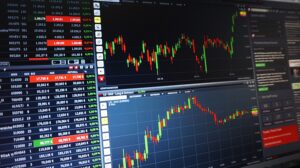Novice investors need to build the wealth creation strategies that work for them, and also know exactly what they want to trade and the best trading vehicles. Exchange Traded Funds Contracts for Difference (ETF CFDs) can be one way to invest in funds, and investment strategies can be geared to the risk levels most acceptable for different individuals.
For example, a younger investor with plenty of time to wait for funds to mature might want to opt for ETF CFDs in the burgeoning artificial intelligence or cryptocurrencies sector, whereas older investors hoping for regular returns could be better advised to look at ETF CFDs in precious metals, such as gold or silver, or in the high dividends sector to ensure regular annual returns.
All ETFs are trading by way of CFDs, so you should check out all the ins and outs of CFD trading before kicking off any purchases.
How do I trade ETF CFDs?
Once you’ve decided to invest in ETF CFDs you’ll need to find a broker specialising in this marketplace. Some online brokers may offer a limited number of ETFs that can be traded, but these may not match your needs exactly.
What kind of ETF CFDs can I trade?
There are countless different ETFs that can be traded in global financial markets, including investment funds that track indices, commodities, bonds, or “baskets” of bundled assets such as cryptocurrencies or stocks and shares. The prices for these ETFs can fluctuate throughout the day as they are traded on markets and values can change dramatically.
However, investing in baskets offers some safety margins, as at times one asset drops considerably the remaining assets may hold their values or go up. This can make ETFs an attractive investment opportunity for many people, particularly when wishing to invest a smaller amount of capital across a broad spectrum.
Some of the most popular 2019 ETFs
ETF CFD trading does require investors to carry out some homework or research on the asset baskets of interest. One recent post highlights a number of the most popular ETF CFDs for different types of investors, and these include:
Property or real estate ETFs which enable investors to benefit from real estate trusts across a diverse selection of properties, such as hotels, commercial portfolios, or retail shopping centres. One major benefit of investing in US-based real estate investment trusts (REITs) is that at least 90% of the annual taxable income of all REITs must be paid to shareholders in the form of dividends. This makes US real estate investments trusts an extremely attractive proposition for any investor.
Precious metals ETFs can be a great solution for anybody looking to hedge against inflation or global recession. Many of these ETFs are guaranteed by holdings in gold, silver, or other precious metals, such as the SPDR Gold Shares or the iShares Gold Trust CFDs,
Other ETF CFDs to consider include utilities’ or energy baskets, or even the entire equity market of countries, such as Brazil or South Korea.







